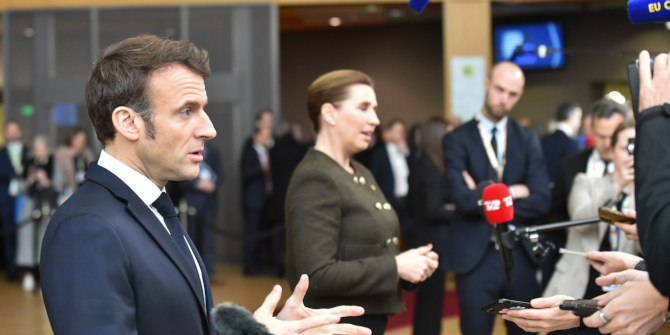 The UK will hold a referendum on its EU membership before the end of 2017. Dennis Novy writes that a divorce from the EU would risk putting the UK in a weaker economic position. Among the reasons he quotes, he mentions an often overlooked issue: that Britain simply does not have the administrative expertise to carry out some of the functions that the EU currently fulfils on behalf of its member states.
The UK will hold a referendum on its EU membership before the end of 2017. Dennis Novy writes that a divorce from the EU would risk putting the UK in a weaker economic position. Among the reasons he quotes, he mentions an often overlooked issue: that Britain simply does not have the administrative expertise to carry out some of the functions that the EU currently fulfils on behalf of its member states.
The option of Britain leaving the European Union sounds superficially attractive. Who doesn’t like the idea of freedom and independence? But it isn’t as simple. In fact, Britain needs Europe a lot more than Europe needs Britain. Isolation is costly.
International trade
Look at international trade. The British economy is heavily exposed to the European Union. The EU is by a mile Britain’s biggest trading partner, covering roughly 45 per cent of imports and exports. In the other direction, Britain is only responsible for less than 10 percent of trade of other EU countries. This asymmetry inevitably results from the fact that the British economy is relatively small compared to the rest of Europe.
To facilitate trade with the European Union, Britain has an interest to adopt the regulations that govern EU trade and investment, with the Single Market at the core. At the moment, Britain still has a place at the negotiating table and plays a part in determining those regulations.
If Brexit happened, Britain would become a passive receiver. This would be the model of Norway and Switzerland. Those countries adopt the same regulations but have essentially zero say. By the way, Norway makes an annual financial contribution to the EU in return for access to the Single Market. From 2009 to 2014, Norway paid almost 1.8bn euros.
Foreign investment
Look at foreign direct investment. Britain has historically received a disproportionately large share of investment coming from non-EU countries. Yes, Britain has an English-language advantage and generally a pro-business climate. But another major reason has been that Britain was perceived by foreigners as an export platform that benefits from easy access to the EU and similar regulations and standards. Once Britain left the EU, this advantage would be eroded.
Look at immigration. It is tempting to blame Britain’s problems on immigrants. However, academic research shows that we need immigration to pay our bills. One reason is the declining fertility of the native British population. Another reason is the skills gap in the British labour market.
The European Union will not accept a deal that allows free trade and investment with an “independent” Britain but without any mutual migration. It is a fantasy to believe that Britain could fully control immigration from the EU once it left. Again look at Norway and Switzerland where migration to and from the EU is commonplace, not least because EU countries demand it.
Then look further abroad beyond Europe. One claim of Brexit campaigners is that an independent Britain would be able to negotiate its own free trade agreements. That is true. But those agreements would be dramatically worse than what the European Union can achieve.
Take the example of the Transatlantic Trade and Investment Partnership or TTIP, a trade agreement that the EU currently negotiates with the United States. If Britain negotiated by itself, it would lack the EU’s negotiating power. The US would possibly make Britain a “take-it-or-leave-it” offer, which is in essence how trade agreements have been negotiated with smaller countries such as Peru or Columbia. But as part of the EU, Britain has leverage and can implement its priorities. Size does matter.
Another, often overlooked issue is that Britain simply does not have the administrative expertise to carry out some of the functions that the EU currently fulfils on behalf of its member states. Again, take the example of international trade negotiations and TTIP. The team hammering out agreements under the guidance of the EU Trade Commissioner in Brussels consists of some of the most experienced and seasoned operators in the business, drawn from all over Europe. These are the best and brightest in the game that can stand up to the venerable team working for the US Trade Representative. It would take Britain years – and serious government resources – to try and match that expertise.
Weakened already
In fact, the Brexit debate is already damaging to British interests right now. Other EU countries do not like the antagonistic approach. They are increasingly irritated at Britain’s hesitation to cooperate, for example when it comes to taking a reasonable share of refugees from Syria.
Eyebrows are also being raised outside of the EU. President Obama has made it clear that he prefers Britain to remain in the EU. When it comes to EU business, many policy makers in Washington are listening less to Britain than they otherwise would, anticipating the decline of British influence in Brussels. Instead, other EU countries like France and Germany increase their impact at Britain’s expense. In other words, Britain’s negotiating hand is already weakened today by the Brexit cloud hanging over the country.
In summary, we cannot just ask whether Britain should leave the EU or stay. The public debate should be relentless in focusing on the counterfactual scenario of a post-Brexit Britain. We have to ask: what would the world look like if Britain were on its own? How exactly would Britain’s international trade be affected? Would foreign direct investment into Britain decline? How can the British government match the policy expertise concentrated in Brussels? And how would other countries perceive a Britain that has lost its crucial influence in Europe?
Please read our comments policy before commenting.
Note: This article was first published on the British Politics and Policy blog, and it gives the views of the author and not the position of EUROPP – European Politics and Policy, nor of the London School of Economics. Please read our comments policy before posting. Credit: Georgina Coupe / Flickr (CC SA-BY 3.0)
Shortened URL for this post: http://bit.ly/1RDV6l2
_________________________
 Dennis Novy is Associate Professor in the Department of Economics at the University of Warwick and Associate at the Centre for Economic Performance at the London School of Economics. He tweets at @DennisNovy
Dennis Novy is Associate Professor in the Department of Economics at the University of Warwick and Associate at the Centre for Economic Performance at the London School of Economics. He tweets at @DennisNovy





I have no British ancestry but, as an Australian, I still feel closer to Britain than any other country. And that is in spite of being an Irish, Belgian, Dutch, Sri Lankan mix. The (true) Brits are great. Must be why it is called Great Britain.
The uk does not need the EU ,the UK will be STRONG and can be PROUD again once we leave behind the costly dictatorial bully boys of the EU. LEAVE LEAVE LEAVE is a must to save this country from being bled dry by Brussels
What a load of rubbish. Britain is the 5th richest country in the world and the fastest growing economy in the G7. How can this guy say that during independent trade negotiation Britain will be treated like Puru or Columbia? just look at Japan an island about the same size as Britain with a similar sized economy (3rd largest in the world we are 5th) yet Japan trades with many country all over the world with no foreign body talking on there behalf. Britain is strong being an independent nation looking out for our own interests as virtually every other country in the world does.
I find these discussions quite baffling in all honesty – it seems to be a case of shouting first and thinking second. Every time someone produces a reasoned explanation of a practical benefit to the EU the response is typically just to instinctively shout “rubbish!” and churn out a bunch of limp soundbites that don’t address the point being made in the first place.
In this case the argument is pretty simple. We live in a globalised world and the rules that govern trade (regulations, practices, etc.) reflect the most economically powerful states. That’s why the US and the EU periodically end up arguing with one another in the WTO, coming to a compromise, and the rest of the world following suit with whatever they decide. That’s one of the main points in the EU existing – if Europe wasn’t pulling together and had different regulations across the 28 member states then the US would find it far easier to have its way in these kinds of negotiations (not to mention growing states like China).
Just shouting “every other country survives by themselves, why can’t we?!” isn’t an argument in that context. Nobody has ever said we can’t live without being in the EU, the point is there are benefits to it and beyond emotive rhetoric and gibberish about the EU costing us billions of pounds a second (figures almost always put forward by dodgy think tanks with a chip on their shoulder like the Bruges Group) there just isn’t much of a case for leaving. In fact it’s precisely the fact that the case for leaving is so weak that has led UKIP to invent a repertoire of entirely fictional arguments instead (pretending the Commission simply dictates laws to powerless governments, pretending the accounts are never signed off when anyone who goes on the Court of Auditors website can see that’s nonsense, ramping up fears of non-existent EU armies and whatever else).
My experience of diehard Eurosceptics is that they seem to think the entirety of mainstream society is simply lying to people about the EU (quite why they’re doing this I still haven’t been able to ascertain, it just seems to be assumed that there’s a gang of “Eurocrats” out there intent on brainwashing everybody). Worse, I’m of the mind that most of these Eurosceptics don’t actually care about whether we benefit from the EU or not, they’re simply intent on winning a referendum for its own sake – we could cripple the country and they wouldn’t care a jot. It satisfies the blood lust for getting rid of “foreigners telling us what to do” so who cares.
It’s high time we stepped into the real world, started judging the EU for what it actually is in reality, and made a simple decision about it. If we want to have some kind of influence in the world – influence over the rules that govern trade with Europe, influence at the WTO, influence over foreign policy issues like Ukraine or ending the migrant crisis – then there’s a clear rationale for staying in. If we want to cut our nose to spite our face then we can vote to leave.
It is Colombia by the way and not “Columbia” and to the one of the people that comments on here it is Peru and not “Puru”. Smaller countries”? Peru is three sizes bigger than the UK!!